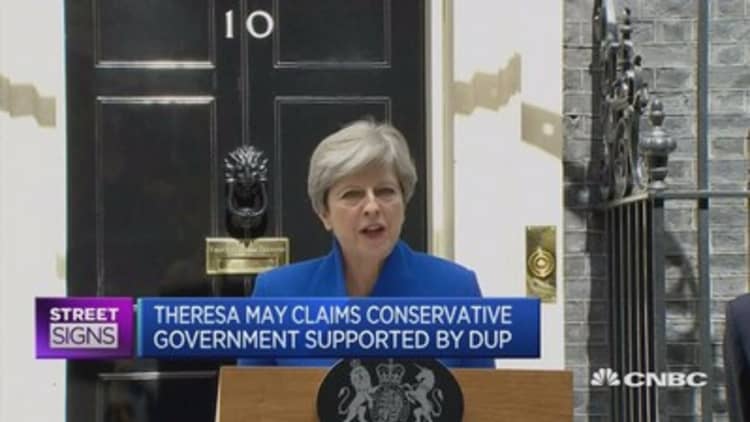The threat of populist governments, Brexit negotiations and a stagnant economy painted a dark picture for Europe going into 2017. However, half way through the year and investors see a renewed political willingness to reform and a growing economy offering several opportunities ahead.
"This was supposed to be the year of political risk events haunting Europe with all the uncertainty and apprehension that goes with this," Jan Randolph, director of sovereign risk at IHS Markit, told CNBC via email.
"As it is turning out however, the euro zone economies are surprising in the upside: higher GDP growth is good for stocks generally; but I think that bar the recent U.K. elections; there hasn't really been any major political upset; again supportive of stocks and slightly net negative for bonds," he added.
Data released last week showed the euro zone grew at its fastest pace since 2015 in the first quarter of this year. Unemployment and employment data has also improved over the last few quarters. As a result, the European Central Bank updated its forward guidance to include lower risks to economic performance after a monetary policy meeting last Thursday.
Populist threat has significantly fallen
Apart from positive economic data, fears over election outcomes in core European countries have also dissipated.
In the Netherlands and France, voters said no to a populist government. On the calendar, there are still elections to take place in Germany and Italy, but the populist threat has fallen by the wayside.
In the specific case of France, voters chose a pro-European and independent candidate, Emmanuel Macron, who is also currently set to win parliamentary elections, giving further reassurances that he will have the necessary political support to push through with his agenda, including reforms on the labour market and deeper euro zone integration.
"Indeed the resounding presidential and likely parliamentary elections over the weekend in France; the poor showing of Five Star in Italy's municipal election also over the weekend and most likely 4th term for Merkel in September – will likely re- invigorate the Merkel-Macron or Franco-German engine that is at the centre of the euro zone project and its direction and political events will give this euro zone engine a new force and rudder – something that investors would be most focused; and likely to carry more positives developments in the next 1-3 years in terms of euro zone integration and EU consolidation, even in parallel with Brexit," Randolph from IHS Markit added.

The regional polls in Italy over the weekend sent the 10-year benchmark yield down by seven basis points on Monday, pushing yields to their lowest level in six months.
"First and foremost it's no surprise that we still have an issue regarding the whole European banking system," Richard Hodges, head of unconstrained fixed income at Nomura Asset Management, told CNBC on Monday, noting that "we've been trying to address this issue and indeed the ECB, and the European banking sector has looking at addressing this issue and has so for the last 2 to 3 years, so that information is there and available."
"What we are doing now is working on the premise that this will all going to be put behind us over the course over the next couple of years, so we're looking to see what periphery looks like compared to core Europe as we move forward in the future," Hodges said, mentioning a "great potential" for peripheral bonds.
Selfish EU downplays Brexit

At the same time, the European institutions seem united ahead of Brexit talks while also focused on how to move the bloc forward.
The European Commission announced last week a proposal for a European defense union – something the U.K. had long opposed – and a few other integration initiatives. This along with a sit-and-wait approach when it comes to Brexit has boosted the image of EU policymaking.
Dan Collins, CEO of CCO Global, told CNBC on Monday that the EU has been showing signs of "stability."
"Hard Brexit is off the table for now and forever," he said, after the conservative government lost its parliamentary majority at a general election last week and consequently its negotiating position.
Collins also recalled a recent speech by Germany's Chancellor Angela Merkel, in which she stated the EU may no longer rely on key partners, including the US, showing the EU's search for independence.
But there are a few points of concern
"Generally speaking, the Eurozone is the big surprise of the year. This has to do with financial markets' tendency to exaggerate, in both directions," Carsten Brzeski, chief economist at ING, said via email. "Again, as much as the Eurozone was not at the edge of breaking up at the beginning of the year, it is now probably also not at the start of a new paradise. The middle is somewhere in the middle. There are still enough structural reforms that will have to be implemented, both economic and institutional," he added.


